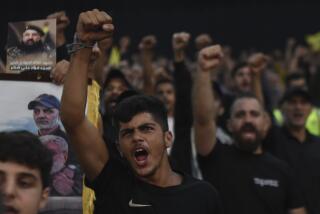The Pain of Victims, Present and Future, Is Power
- Share via
What does the terrorist attacker of Jews in Israel really seek? What was the rationale of the suicide bombers who created the Mahane Yehuda market massacre of mainly women and children? Above all else, the terrorist who kills Israelis is a coward who attempts to transform others’ pain into his power. He has learned that to be purposeful, pain must always point toward death, although not necessarily kill comprehensively.
This is not to suggest, of course, that Arab terrorists do not seek to produce dead Israelis, but only that leaving live Jewish witnesses who will themselves now fear annihilation is an essential part of the hideous terrorist drama.
A grotesque form of theater that draws political power from the innermost depths of privacy, terrorism manipulates and amplifies pain within the individual body for the express purpose of influencing others who live outside that body. Violating the inviolable, it declares with unspeakable cruelty that no one is immune.
Israel hears from the Arab world and elsewhere that the “martyrs” of PLO/Hamas/Islamic Jihad have a distinct political motive. They kill to “recover the land,” to “reclaim our rights,” to “return to our country.” Once these proper objectives are realized, Israel is instructed, all will be well. The killers will embrace a life of peace. There will be no more infliction of pain upon Jews. War against the Jewish state will happily announce its own end. But while Israel hears, it does not understand.
Like the victim of torture, who is told again and again that his pain is related to a reluctant disclosure of information, Israel confronts a masquerade. The declared motive of the perpetrator is largely a fiction. The torturer tortures because he enjoys it. The terrorist terrorizes because that, exactly, is what he wants to do.
The terrorists who produced dismembered Jewish limbs and body parts among the Mahane Yehuda watermelons cannot be stopped by giving in to terror. The Palestinian terrorist will cease his terror only when the Jewish state has itself ceased to exist.
As the victims’ suffering grows, so does the power of the terrorist. And as the power of the terrorist grows, so does the pain of his victims. For the bystanders, and this includes all of Israel that is not directly involved in a particular terrorist attack, each infliction of pain is a mock execution, a reminder of total Israeli vulnerability.
What matters most to the terrorists, after they have inflicted great pain upon victim Jewish populations, is not so much the content of the government’s response but the form of the response. That the government has chosen to answer the terrorists on their own terms represents an enormous expansion of terrorist power.
With each successive act of terrorism, Israel loses more of its voice. After a time, if nothing more is done about the exploitation of Jewish pain as Islamic power, Jerusalem will be left mute. In response, the Palestinian terrorist, confronted with a victim who has become substantially pitiable, will close in with foreseeable ferocity for the coup de grace.
There is one last point, an observation spawned perhaps by my long scholarly involvement with the threat of “higher-order” (chemical/biological/nuclear) terrorism. A terrorist escalation in the “quality” of terror could follow.
All terrorism intends to change a prospective victim’s general awareness that everyone must eventually die to the more specific awareness, “I must die and maybe soon.”
Insofar as a resort to vastly more destructive forms of terror could hasten this change, such resort should certainly not be dismissed out of hand. The facile, cliched observation among terrorism “experts” these days that “terrorists have no reason to escalate” is a product of the most fragile syllogisms.
Summing up, the pain occasioned by terrorism, a pain that confers power upon the terrorist, begins within the private body, and then spills out more widely into the body politic. Wanting the two realms to become indistinguishable, the terrorist understands that it is certainly not enough that the victims feel pain. Rather, the pain must also be felt vicariously by all those who might become victims in the future. It is these prospective Israeli victims who should now pay special heed.
More to Read
Sign up for Essential California
The most important California stories and recommendations in your inbox every morning.
You may occasionally receive promotional content from the Los Angeles Times.










